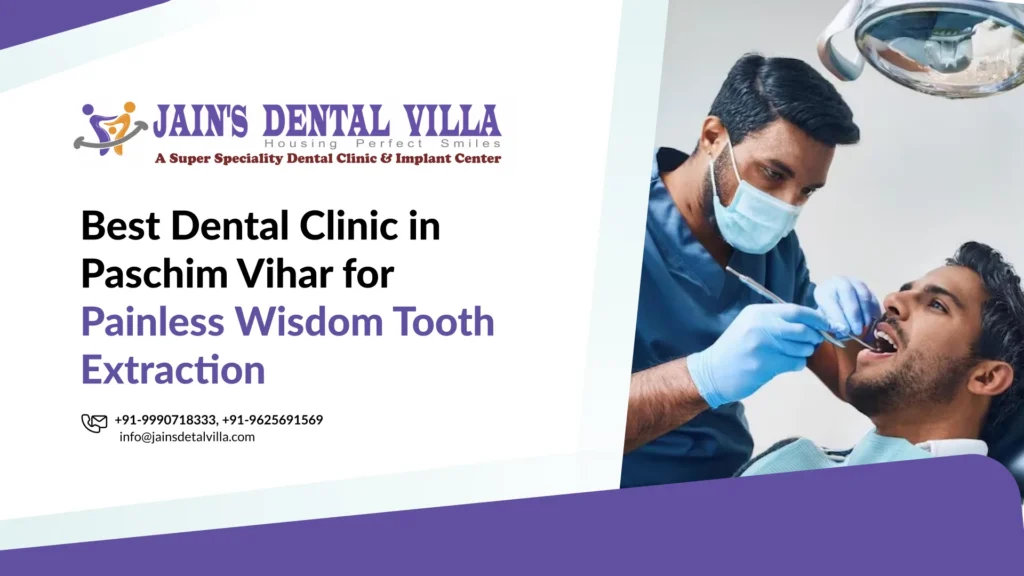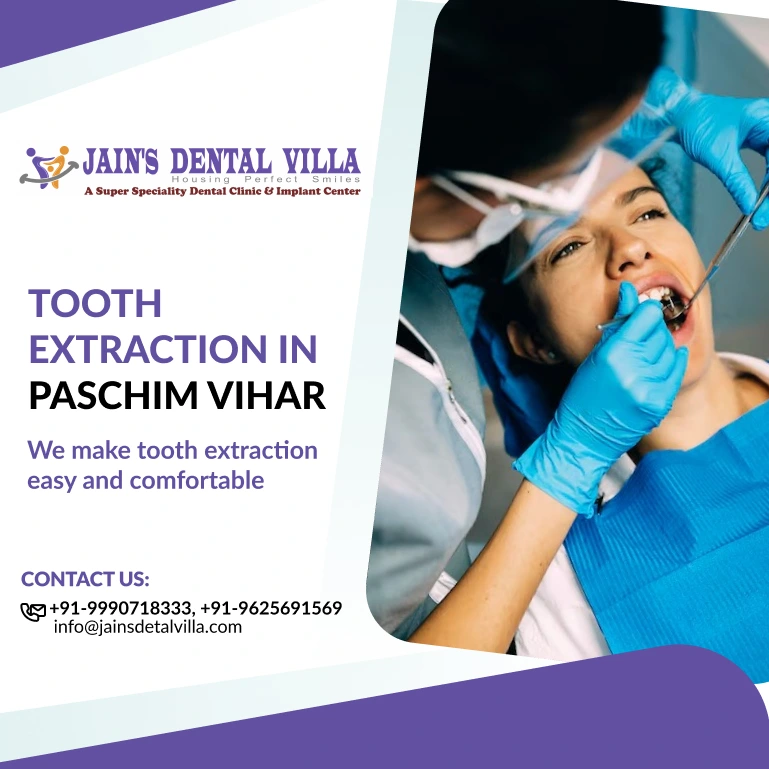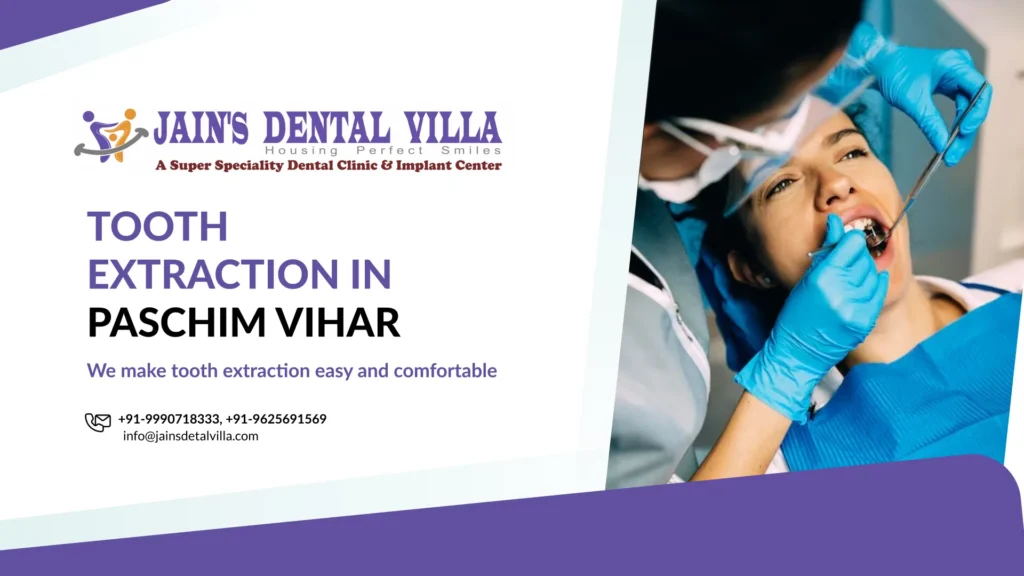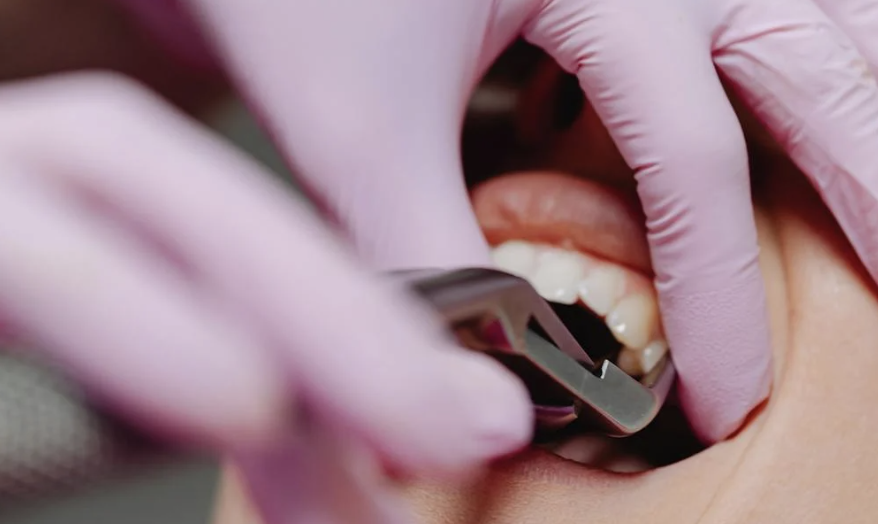You may require wisdom teeth removal if they cause pain, grow in a crooked manner or lead to other oral health problems. In certain cases, dentists recommend wisdom tooth extraction preventively, before the problem progresses further. This common oral surgery treatment takes about one hour to complete. Complete recovery takes about two weeks. If you are looking for a dental clinic in Paschim Vihar, come down to Jain’s Dental Villa. Tooth extraction in Paschim Vihar is easily accessible at Jain’s Dental Villa.

What is a wisdom tooth and why does it require extraction?
What are wisdom teeth?
Wisdom teeth are your final set of teeth that erupt or grown-in. They are also referred to as third molars. Wisdom teeth are located at the back of the mouth. They are referred to as wisdom teeth since they develop much later than other permanent teeth. Wisdom teeth generally form between the ages of 17 and 25.
Infection and Overcrowding of Wisdom Teeth
Sometimes, wisdom teeth grow-in correctly and do not lead to any issues. When wisdom teeth get stuck in your jawbone or gums and don’t grow in, it can lead to infection, cavities, gum disease and other oral health problems. This can result in pain and damage to other teeth. Wisdom teeth are more likely to be affected by decay and gum disease since they are harder to clean. In such cases, wisdom tooth extraction is needed.
Significance of Early Diagnosis
Indications of gum infection caused by wisdom teeth include redness of gums, swelling of the face, pain and sensitivity, pus coming from the gum, difficulty in opening the mouth and swallowing, bad breath, and fever. It is important to identify the above symptoms early in order to prevent further complications.
When should you go for wisdom tooth extraction?
Symptoms
Pain in the wisdom teeth, continuous infection of the soft tissue at the back of the last lower tooth, sacs filled with fluids called cysts, damage to neighbouring teeth, gum disease, and tooth decay. When wisdom teeth grow at an unnatural angle, they come out crooked or out of shape. This causes damage to neighbouring teeth.
Why is it important to see a dentist?
You should schedule an appointment with your dentist if you are experiencing acute pain or discomfort in your wisdom teeth. The above symptoms should not be neglected as it can lead to further complications. An X-ray of the mouth is carried out by the dentist to identify the nature and extent of the issue.
Why Neglecting Wisdom Tooth Extraction Can be Risky?
When you delay wisdom tooth extraction, there is a greater threat of infection due to bacteria in your mouth. Infections can be painful and result in further complications. Incorrect eruption of wisdom teeth can have an impact on neighbouring teeth. They can move from their original position. This results in pain and overcrowding making it hard to brush and floss properly. Visit Jain’s Dental Villa for tooth extraction in Paschim Vihar.
Also read:- Tooth Extraction in Paschim Vihar
How advanced dental technology makes extraction painless
Use of Latest Techniques
Advances in dental technology have significantly improved accuracy and results in wisdom teeth surgery. 3D imaging has simplified the procedure of wisdom tooth extraction. Modern methods decrease damage to tissue. Laser guided methods reduce bleeding and healing time. In addition, modern anesthesia is customized for individual requirements. Jain’s Dental Villa, a well-known dental clinic in Paschim Vihar provides wisdom tooth extraction services.
Minimization of Pain
Your dentist may prescribe medication to minimize pain prior to the procedure. This medication can manage pain and swelling. The main way in which pain is controlled during the procedure is through anesthesia. In most cases, local anesthesia is administered. But in certain instances, a general anesthesia may be required.
Thanks to advancements in dental technology, dentists are able to use modern techniques resulting in greater precision and reduced pain. After surgery, your dentist will prescribe medication to keep the pain in check. Ice packs can be applied on the outside of the cheek to manage swelling and pain.
Customized Treatment Plans
Structure of the jaw, position of the tooth, and general health are some of the important factors that need to be considered before going ahead with the extraction procedure. The above factors are different for each patient. At Jain’s Dental Villa, we assess the above factors and suggest a personalized treatment plan based on the unique requirements of the patient.
Step by step procedure of wisdom tooth extraction
Preliminary Consultation
When you come down to Jain’s Dental Villa for a consultation, we begin by discussing your dental issue. Your mouth is examined and an X-ray is taken. This is done to understand the position of your teeth. The dentist explains to you whether you require a simple extraction or a surgical procedure. At Jain’s Dental Villa we provide wisdom tooth extraction services.
Preparation for the Surgery
Prior to the surgery, your medical history is evaluated. Anesthesia options are clearly explained. Depending on the case, a local or general anesthesia is administered. Thanks to Jain’s Dental Villa, tooth extraction in Paschim Vihar is easily accessible.
Surgery and Aftercare
The dentist makes a small opening in the gum if the tooth is impacted. In some cases, division of the tooth into smaller pieces is carried out for simpler removal. After removal, the region is cleaned, and stitches may be required. The time taken for the procedure is usually between 30 and 60 minutes, depending on the type of case.
Bleeding and swelling are common in the first 24 hours after the procedure. Pain can be managed with the help of over the counter painkillers prescribed by your dentist. It is important to consume only soft foods after the procedure. Avoid foods that are hard, sticky, and spicy. Oral hygiene can be maintained by washing the mouth gently with warm salt water.
Healing and aftercare measures
Initial Recovery
Swelling and bleeding are common 24 hours after the surgery. Biting on a gauze will help reduce bleeding. Keep changing the gauze as required. Raise your head with a pillow and do not lie flat. Swelling can persist for three days after the surgery. An icepack can be used on the outside of the cheek to manage swelling. Icepacks need not be used after 24 hours.
Tips for Recovery
If anesthesia has been used during the procedure, the patient may experience sensations such as vomiting. It is important to take medication along with food to manage these issues. Painkillers, which are prescribed after the procedure, may also have certain side effects. Discuss these side effects with your dentist. Recovery time changes from one person to another. Recovery might take longer if the blood clot detaches from the wound or if the wound gets infected.
Getting Back to Normal Activities
Healing time differs, depending on the individual. But most patients can get back to work 2-3 days after the procedure. It might take more time if the job needs greater physical activity. Activities that cause strain must be avoided for the first few days.
Why Choose Jain’s Dental Villa for Wisdom Tooth Extraction in Paschim Vihar?
Selecting the correct dentist for wisdom tooth extraction is an important initial step. At Jain’s Dental Villa, Dr. Himesh Jain and the committed team ensure a comfortable, relaxing and professional setting. Our dedication to advanced dental care makes us the best dental clinic in Paschim Vihar.
FAQs
What are the symptoms of wisdom teeth?
Pain in the jaw, swelling near the gums, and discharge if an infection is present are some of the symptoms of wisdom teeth. You might also notice the wisdom tooth enamel coming out through the gum behind the second molar.
When do wisdom teeth come in?
Wisdom teeth generally emerge between the ages of 17 and 25. In most cases, however, the mouth is too crowded for third molars to develop properly. Sometimes, wisdom teeth develop normally.
What is a dry socket?
Dry socket is a temporary complication that comes up when a blood clot detaches from the extraction area, exposing tissue. It can be painful, but most cases can be avoided by taking certain precautions such as not smoking and not drinking from straws.
What can I eat after wisdom tooth extraction?
Soft foods that are easy to digest must be consumed after tooth extraction. Avoid foods that are hard and spicy.
Do wisdom teeth need to be removed?
If there is not enough space for third molars to fully form, several issues can occur. Some of these issues include infection, formation of cysts, crowding, and damage to neighbouring teeth.
How much time does the procedure take?
The entire procedure takes a little more than 1 hour. It depends on the position of your wisdom teeth and the type of anesthesia used. Jain’s Dental Villa is a dental clinic in Paschim Vihar that offers wisdom tooth extraction services.
When should wisdom teeth be removed?
It is easier to recover if wisdom teeth are removed in your teenage years. Younger patients can recover quicker than older ones.
Is the procedure painful?
The patient will not experience pain during the procedure since anesthesia is used. Once the effects of anesthesia have worn off, it is normal to experience some pain. This pain can be managed by painkillers prescribed by the dentist. Tooth extraction in Paschim Vihar is available at Jain’s Dental Villa.





